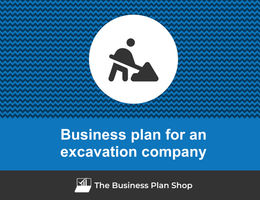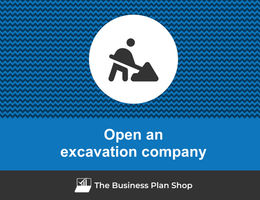How to create a financial forecast for an excavation company?
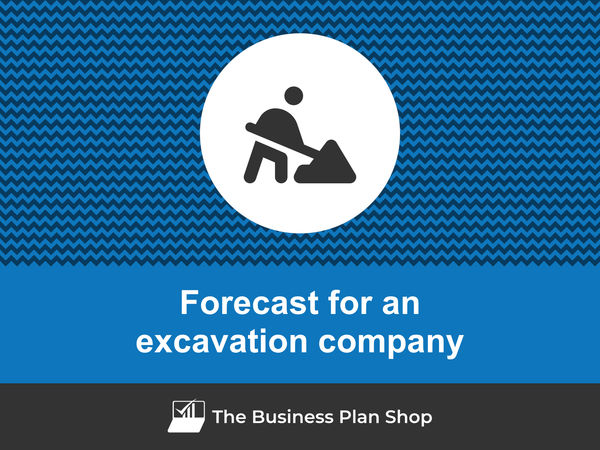
Developing and maintaining an up-to-date financial forecast for your excavation company is key in order to maintain visibility on your business’s future cash flows.
If you feel overwhelmed at the thought of putting together an excavation company financial forecast then don’t worry as this guide is here to help you.
We'll cover everything from: the main objectives of a financial forecast, the data you need to gather before starting, to the tables that compose it, and the tools that will help you create and maintain your forecast efficiently.
Let's get started!
Why create and maintain a financial forecast for an excavation company?
In order to prosper, your business needs to have visibility on what lies ahead and the right financial resources to grow. This is where having a financial forecast for your excavation company becomes handy.
Creating an excavation company financial forecast forces you to take stock of where your business stands and where you want it to go.
Once you have clarity on the destination, you will need to draw up a plan to get there and assess what it means in terms of future profitability and cash flows for your excavation company.
Having this clear plan in place will give you the confidence needed to move forward with your business’s development.
Having an up-to-date financial forecast for an excavation company is also useful if your trading environment worsens, as the forecast enables you to adjust to your new market conditions and anticipate any potential cash shortfall.
Finally, your excavation company's financial projections will also help you secure financing, as banks and investors alike will want to see accurate projections before agreeing to finance your business.
Need a convincing business plan?
The Business Plan Shop makes it easy to create a financial forecast to assess the potential profitability of your projects, and write a business plan that’ll wow investors.

What information is used as input to build an excavation company financial forecast?
A excavation company's financial forecast is only as good as the inputs used to build it.
If you are creating (or updating) the forecast of an existing excavation company, then you mostly need your accounting information, key historical operating non-financial data, and your team’s input on what to expect for the coming years.
If you are building financial projections for an excavation company startup, you will need to have done your research and have a clear picture of your competitive environment and go-to-market strategy so that you can forecast sales accurately.
For a new venture, you will also need a precise list of the resources needed to keep the excavation company running on a day-to-day basis and a list of the equipment and expenditures required to start the business (more on that later).
Let's now take a closer look at the elements that make up your excavation company's financial forecast.
The sales forecast for an excavation company
From experience, it is usually best to start creating your excavation company financial forecast by your sales forecast.
To create an accurate sales forecast for your excavation company, you will have to rely on the data collected in your market research, or if you're running an existing excavation company, the historical data of the business, to estimate two key variables:
- The average price
- The number of monthly transactions
To get there, you will need to consider the following factors:
- Weather conditions: The average price of your excavation services may be affected by the weather conditions in your region. Harsh weather conditions, such as heavy rainfall or snow, can make it difficult to carry out excavation work, resulting in higher prices due to the need for specialized equipment or longer project timelines.
- Competition: The number of monthly transactions for your excavation company can be influenced by the level of competition in your area. If there are many other excavation companies competing for the same projects, it may be challenging to maintain a steady flow of transactions and may require you to lower your prices to remain competitive.
- Economic conditions: Economic trends and fluctuations can also impact the average price and number of monthly transactions for your business. In times of economic downturn, customers may be more hesitant to invest in large excavation projects, resulting in a decrease in both price and number of transactions.
- Construction industry trends: The construction industry is closely tied to excavation services, and any changes in construction trends can affect your business. For example, if there is a shift towards more eco-friendly construction methods, you may need to invest in new equipment or techniques, which could impact your pricing and number of transactions.
- Land availability: The availability of land for excavation projects can also impact your average price and number of transactions. If there is a shortage of land in your area, it may result in higher demand for your services, allowing you to charge premium prices and potentially increase the number of monthly transactions.
Once you have an idea of what your future sales will look like, it will be time to work on your overhead budget. Let’s see what this entails.
Need a convincing business plan?
The Business Plan Shop makes it easy to create a financial forecast to assess the potential profitability of your projects, and write a business plan that’ll wow investors.

The operating expenses for an excavation company
Once you know what level of sales you can expect, you can start budgeting the expenses required to operate your excavation company on a daily basis.
Expenses normally vary based on how much revenue you anticipate (which is why, from experience, it is always better to start your forecast with the topline projection), and where your business is based.
Operating expenses for an excavation company will include some of the following items:
- Staff Salaries and Benefits: This includes the wages, bonuses, and benefits of all employees, including excavators, drivers, office staff, and management.
- Equipment Rental: Excavation companies often need to rent heavy machinery such as excavators, bulldozers, and loaders for projects.
- Fuel and Maintenance: Excavation work requires a lot of fuel for machinery, as well as regular maintenance and repairs.
- Materials and Supplies: This includes the cost of materials such as gravel, sand, and concrete, as well as supplies like safety gear and tools.
- Insurance: Excavation work can be risky, so it's important to have insurance coverage for liability, workers' compensation, and equipment.
- Accounting and Bookkeeping Fees: You may need to hire an accountant or bookkeeper to manage your financial records and taxes.
- Advertising and Marketing: To attract new clients, you may need to spend money on advertising and marketing efforts, such as website development and print ads.
- Rent or Mortgage: If you have an office or storage space, you will need to pay rent or mortgage fees.
- Utilities: This includes electricity, water, and internet services for your office and equipment.
- Software Licenses: Excavation companies may use specialized software for estimating, project management, and accounting, which may require annual license fees.
- Legal Fees: You may need to consult with a lawyer for contracts, permits, and other legal matters.
- Banking Fees: This includes fees for processing credit card payments, wire transfers, and bank account maintenance.
- Vehicle Expenses: If you have company vehicles, you will need to budget for fuel, maintenance, and insurance.
- Training and Certifications: Excavation workers may need to attend training programs and obtain certifications to operate heavy machinery and ensure safety.
- Office Supplies and Equipment: This includes the cost of office supplies such as paper, ink, and furniture, as well as office equipment like computers and printers.
This list will need to be tailored to the specificities of your excavation company, but should offer a good starting point for your budget.
What investments are needed to start or grow an excavation company?
Creating and expanding an excavation company also requires investments which you need to factor into your financial forecast.
Capital expenditures and initial working capital items for an excavation company could include elements such as:
- Excavation Machinery: This includes heavy equipment such as excavators, bulldozers, dump trucks, and loaders. These are essential for any excavation company as they are used to dig, move, and transport materials on a construction site.
- Land and Property: As an excavation company, you will need to purchase or lease a suitable plot of land or property to carry out your operations. This could include a storage yard, office space, or a workshop for maintenance and repairs.
- Safety Equipment: Safety is a top priority in the excavation industry, and as such, you will need to invest in various safety equipment such as hard hats, safety vests, boots, gloves, and harnesses. These items are crucial for the protection of your employees and compliance with safety regulations.
Again, this list is not exhaustive and will need to be adjusted according to the circumstances of your excavation company.
Need a convincing business plan?
The Business Plan Shop makes it easy to create a financial forecast to assess the potential profitability of your projects, and write a business plan that’ll wow investors.

The financing plan of your excavation company
The next step in the creation of your financial forecast for your excavation company is to think about how you might finance your business.
You will have to assess how much capital will come from shareholders (equity) and how much can be secured through banks.
Bank loans will have to be modelled so that you can separate the interest expenses from the repayments of principal, and include all this data in your forecast.
Issuing share capital and obtaining a bank loan are two of the most common ways that entrepreneurs finance their businesses.
What tables compose the financial plan for an excavation company?
Now let's have a look at the main output tables of your excavation company's financial forecast.
The forecasted profit & loss statement
The profit & loss forecast gives you a clear picture of your business’ expected growth over the first three to five years, and whether it’s likely to be profitable or not.
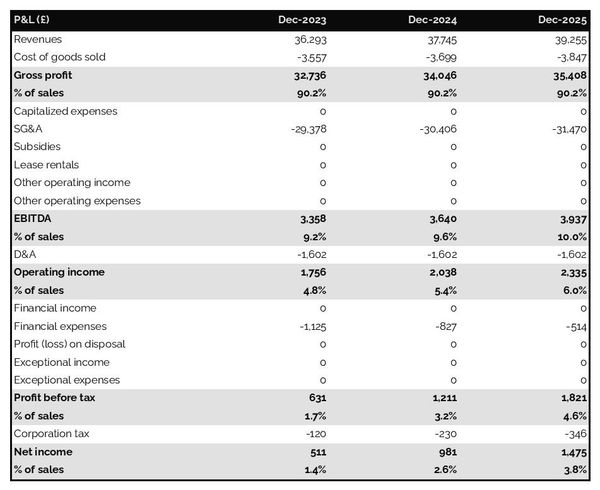
A healthy excavation company's P&L statement should show:
- Sales growing at (minimum) or above (better) inflation
- Stable (minimum) or expanding (better) profit margins
- A healthy level of net profitability
This will of course depend on the stage of your business: numbers for an established excavation company will look different than for a startup.
The projected balance sheet
Your excavation company's forecasted balance sheet enables you to assess your financial structure and working capital requirements.
It is composed of three types of elements: assets, liabilities and equity:
- Assets: represent what the business owns and uses to produce cash flows. It includes resources such as cash, equipment, and accounts receivable (money owed by clients).
- Liabilities: represent funds advanced to the business by lenders and other creditors. It includes items such as accounts payable (money owed to suppliers), taxes due and loans.
- Equity: is the combination of what has been invested by the business owners and the cumulative profits and losses generated by the business to date (which are called retained earnings). Equity is a proxy for the value of the owner's stake in the business.
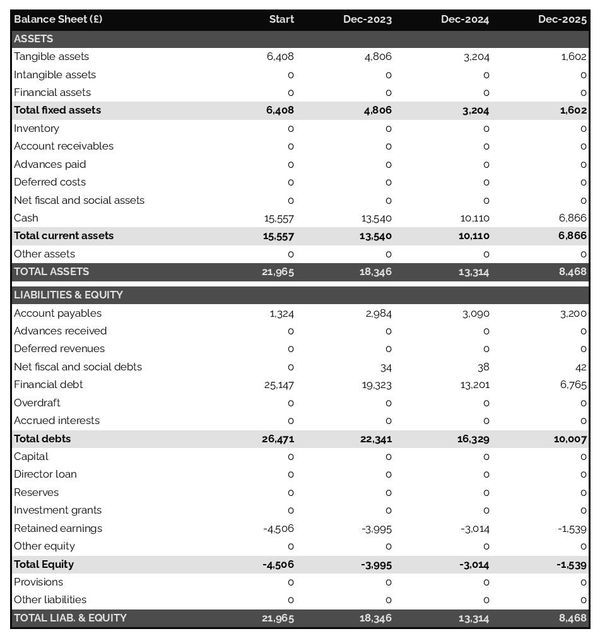
The cash flow forecast
Your excavation company's cash flow forecast shows how much cash your business is expected to consume or generate in the years to come.
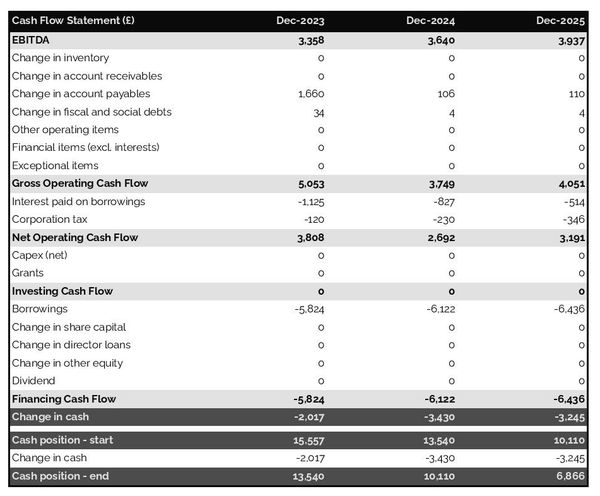
It is best practice to organise the cash flow forecast by nature to better explain where cash is used or generated by the excavation company:
- Operating cash flow: shows how much cash is generated by the operating activities
- Investing cash flow: shows how much will be invested in capital expenditure to maintain or expand the business
- Financing cash flow: shows if the business is raising new capital or repaying financiers (debt repayment, dividends)
Keeping an eye on (and regularly updating) your excavation company's cash flow forecast is key to ensuring that your business has sufficient liquidity to operate normally and to detect financing requirements as early as possible.
If you are trying to raise capital, you will normally be asked to provide a monthly cash flow forecast in your excavation company's financial plan - so that banks or investors can assess seasonal variation and ensure your business is appropriately capitalised.
Need a convincing business plan?
The Business Plan Shop makes it easy to create a financial forecast to assess the potential profitability of your projects, and write a business plan that’ll wow investors.

Which tool should you use to create your excavation company's financial forecast?
Using the right tool or solution will make the creation of your excavation company's financial forecast much easier than it sounds. Let’s explore the main options.
Using online financial projection software to build your excavation company's forecast
The modern and easiest way to build a forecast is to use professional financial projection software such as the one we offer at The Business Plan Shop.
There are several advantages to using specialised software:
- You can easily create your financial forecast by letting the software take care of the financial calculations for you without errors
- You have access to complete financial forecast templates
- You get a complete financial forecast ready to be sent to your bank or investors
- You can easily track your actual financial performance against your financial forecast, and recalibrate your forecast as the year goes by
- You can create scenarios to stress test your forecast's main assumptions
- You can easily update your forecast as time goes by to maintain visibility on future cash flows
- You have a friendly support team on standby to assist you when you are stuck
- It’s cost-efficient and much cheaper than using an accountant or consultant (see below)
If you are interested in this type of solution, you can try our forecasting software for free by signing up here.
Hiring a financial consultant or chartered accountant
Hiring a consultant or chartered accountant is also an efficient way to get a professional excavation company financial projection.
As you can imagine, this solution is much more expensive than using software. From experience, the creation of a simple financial forecast over three years (including a balance sheet, income statement, and cash flow statement) is likely to start around £700 or $1,000 excluding taxes.
The indicative estimate above, is for a small business, and a forecast done as a one-off. Using a financial consultant or accountant to track your actuals vs. forecast and to keep your financial forecast up to date on a monthly or quarterly basis will naturally cost a lot more.
If you choose this solution, make sure your service provider has first-hand experience in your industry, so that they may challenge your assumptions and offer insights (as opposed to just taking your figures at face value to create the forecast’s financial statements).
Why not use a spreadsheet such as Excel or Google Sheets to build your excavation company's financial forecast?
Creating an accurate and error-free excavation company financial forecast with a spreadsheet is very technical and requires a deep knowledge of accounting and an understanding of financial modelling.
Very few business owners are financially savvy enough to be able to build a forecast themselves on Excel without making mistakes.
Lenders and investors know this, which is why forecasts created on Excel by the business owner are often frowned upon.
Having numbers one can trust is key when it comes to financial forecasting and to that end using software is much safer.
Using financial forecasting software is also faster than using a spreadsheet, and, with the rise of artificial intelligence, software is also becoming smarter at helping us analyse the numbers to make smarter decisions.
Finally, like everything with spreadsheets, tracking actuals vs. forecasts and keeping your projections up to date as the year progresses is manual, tedious, and error-prone. Whereas financial projection software like The Business Plan Shop is built for this.
Need a convincing business plan?
The Business Plan Shop makes it easy to create a financial forecast to assess the potential profitability of your projects, and write a business plan that’ll wow investors.

Use our financial forecast templates for inspiration
The Business Plan Shop has dozens of financial forecast examples available.
Our templates contain both a financial forecast and a written business plan which presents, in detail, the company, the team, the strategy, and the medium-term objectives.
Our templates are a great source of inspiration, whether you just want to see what a complete business plan looks like, or are looking for concrete examples of how you should model financial elements in your own forecast.
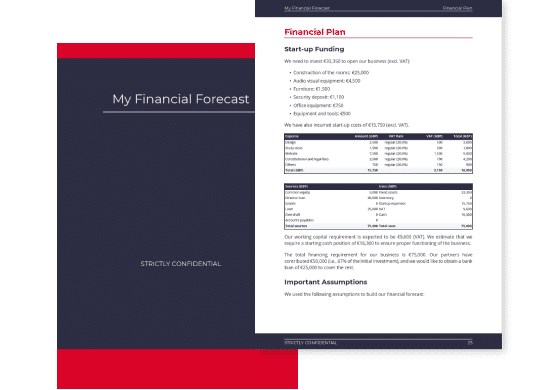
Takeaways
- A financial projection shows expected growth, profitability, and cash generation for your business over the next three to five years.
- Tracking actuals vs. forecast and keeping your financial forecast up-to-date is the only way to maintain visibility on future cash flows.
- Using financial forecasting software makes it easy to create and maintain up-to-date projections for your excavation company.
You have reached the end of our guide. We hope you now have a better understanding of how to create a financial forecast for an excavation company. Don't hesitate to contact our team if you have any questions or want to share your experience building forecasts!
Need a convincing business plan?
The Business Plan Shop makes it easy to create a financial forecast to assess the potential profitability of your projects, and write a business plan that’ll wow investors.

Also on The Business Plan Shop
- Example of financial projections
- How to create a sales forecast for a business?
- Example of financial forecast for business idea
Know someone who runs or wants to start an excavation company? Share our financial projection guide with them!


